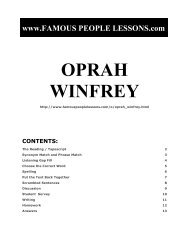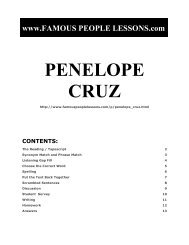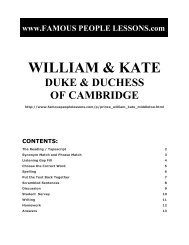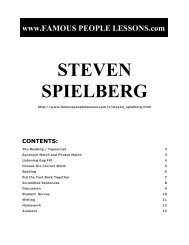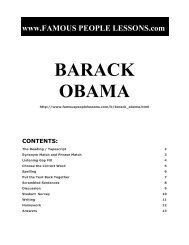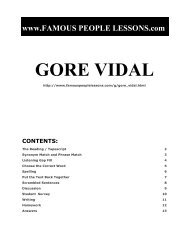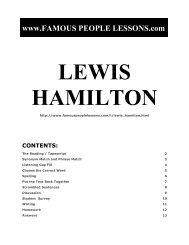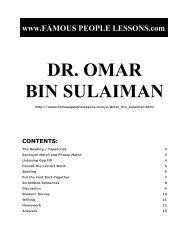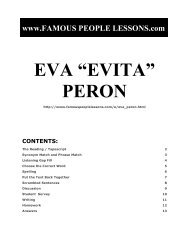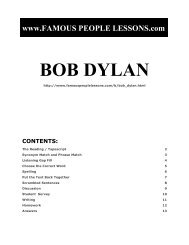DR. MARTIN LUTHER KING JR. - Famous People Lessons.com
DR. MARTIN LUTHER KING JR. - Famous People Lessons.com
DR. MARTIN LUTHER KING JR. - Famous People Lessons.com
You also want an ePaper? Increase the reach of your titles
YUMPU automatically turns print PDFs into web optimized ePapers that Google loves.
www.FAMOUS PEOPLE LESSONS.<strong>com</strong><br />
<strong>DR</strong>. <strong>MARTIN</strong><br />
<strong>LUTHER</strong> <strong>KING</strong> <strong>JR</strong>.<br />
http://www.famouspeoplelessons.<strong>com</strong>/m/martin_luther_king.html<br />
CONTENTS:<br />
The Reading / Tapescript 2<br />
Synonym Match and Phrase Match 3<br />
Listening Gap Fill 4<br />
Choose the Correct Word 5<br />
Spelling 6<br />
Put the Text Back Together 7<br />
Scrambled Sentences 8<br />
Discussion 9<br />
Student Survey 10<br />
Writing 11<br />
Homework 12<br />
Answers 13
THE READING / TAPESCRIPT<br />
Copyright © www.<strong>Famous</strong><strong>People</strong><strong>Lessons</strong>.<strong>com</strong> 2<br />
<strong>DR</strong>. <strong>MARTIN</strong> <strong>LUTHER</strong> <strong>KING</strong> <strong>JR</strong>.<br />
Dr. Martin Luther King Jr. was the most important leader of the<br />
American civil rights movement. He helped unite a nation with his<br />
powerful speeches and use of non-violent protests. His 1963 “I Have a<br />
Dream” speech is one of the greatest in human history. King’s efforts<br />
to end racial discrimination earned him the Nobel Peace Prize in 1964.<br />
King was born in 1929 in Atlanta. His father was a reverend and so<br />
King had a religious upbringing. He graduated from college with a<br />
degree and a Ph.D. in religious studies. King went to India to visit<br />
Gandhi’s family. He was inspired by Mohandas Gandhi's success with<br />
non-violent resistance and saw it as a “potent weapon” in America’s<br />
struggle for civil rights.<br />
King was instrumental in achieving many successes in ending<br />
segregation laws. He led the Montgomery Bus Boycott which ended<br />
racial segregation on public buses in Montgomery. He realized that<br />
non-violent protest would attract extensive media coverage of the<br />
struggle for racial equality. His campaigns soon elevated the Civil<br />
Rights Movement to be the most important issue in American politics.<br />
King helped organize the famous Million Man March on Washington in<br />
1963, where he spoke to the nation appealing for racial harmony. His<br />
non-violent protests met with success as Congress passed civil rights<br />
laws (1964) and voting rights laws (1965). King’s friendship with<br />
President John F. Kennedy also helped his cause. King was<br />
assassinated on April 4, 1968. Stevie Wonder pays tribute to King with<br />
his song "Happy Birthday".
Copyright © www.<strong>Famous</strong><strong>People</strong><strong>Lessons</strong>.<strong>com</strong> 3<br />
<strong>DR</strong>. <strong>MARTIN</strong> <strong>LUTHER</strong> <strong>KING</strong> <strong>JR</strong>.<br />
SYNONYM MATCH: Match the words from the article on the left with their<br />
synonyms on the right. Are your answers the same as other students’?<br />
Paragraphs 1 and 2<br />
1. unite a. racism<br />
2 protests b. battle<br />
3. discrimination c. demonstrations<br />
4. inspired d. powerful<br />
5. potent e. join<br />
6. struggle f. motivated<br />
Paragraphs 3 and 4<br />
7. instrumental g. mission<br />
8. realized h. wide<br />
9. extensive i. understood<br />
10. appealing j. important<br />
11 cause k killed<br />
12 assassinated l asking<br />
PHRASE MATCH: Match the following phrases from the article.<br />
1. leader of the American civil a. discrimination<br />
2 He helped unite a nation with b. with non-violent resistance<br />
3. end racial c. with success<br />
4. King had a religious d. laws<br />
5. inspired by Mohandas Gandhi's success e. his powerful speeches<br />
6. ending segregation f. in American politics<br />
7. attract extensive media g. for racial harmony<br />
8. the most important issue h. upbringing<br />
9. he spoke to the nation appealing i. rights movement<br />
10. His non-violent protests met j. coverage
LISTENING GAP FILL:<br />
Copyright © www.<strong>Famous</strong><strong>People</strong><strong>Lessons</strong>.<strong>com</strong> 4<br />
<strong>DR</strong>. <strong>MARTIN</strong> <strong>LUTHER</strong> <strong>KING</strong> <strong>JR</strong>.<br />
Dr. Martin Luther King Jr. was the most important ________________<br />
American civil rights movement. He helped ________________ his<br />
powerful speeches and use of non-violent protests. His 1963 “I Have a<br />
Dream” ________________ the greatest in human history. King’s<br />
efforts to end racial discrimination ________________ Nobel Peace<br />
Prize in 1964.<br />
King was born in 1929 in Atlanta. His father was a reverend and so<br />
King had a ________________. He graduated from college with a<br />
degree and a Ph.D. in religious studies. King went to India to visit<br />
Gandhi’s family. He ________________ Mohandas Gandhi's success<br />
with ________________ and saw it as a “potent weapon” in America’s<br />
________________ rights.<br />
King was instrumental __________________ successes in ending<br />
segregation laws. He led the Montgomery Bus Boycott which<br />
________________ segregation on public buses in Montgomery. He<br />
realized that non-violent protest would ________________ media<br />
coverage of the struggle for racial equality. His campaigns soon<br />
elevated the Civil Rights Movement to be the most<br />
________________ American politics.<br />
King ________________ famous Million Man March on Washington in<br />
1963, where he spoke to the ________________ for racial harmony.<br />
His non-violent protests met with success as Congress passed civil<br />
rights laws (1964) and ________________ (1965). King’s friendship<br />
with President John F. Kennedy also ________________. King was<br />
assassinated on April 4, 1968. Stevie Wonder pays tribute to King with<br />
his song "Happy Birthday".
CHOOSE THE CORRECT WORD:<br />
Delete the wrong word in each of the pairs in italics.<br />
Copyright © www.<strong>Famous</strong><strong>People</strong><strong>Lessons</strong>.<strong>com</strong> 5<br />
<strong>DR</strong>. <strong>MARTIN</strong> <strong>LUTHER</strong> <strong>KING</strong> <strong>JR</strong>.<br />
Dr. Martin Luther King Jr. was the most important leadership / leader<br />
of the American civil rights movement. He helped unite / untie a nation<br />
with his powerful speeches and use of non-violent protests. His 1963<br />
“I Have a Dream” speech is one of the great / greatest in human<br />
history. King’s efforts to / for end racial discrimination earned him the<br />
Nobel Peace Prize in 1964.<br />
King was born in 1929 in Atlanta. His father was a reverend and such /<br />
so King had a religious upbringing. He graduated from college with a<br />
degree and a Ph.D. in religious students / studies. King went to India<br />
to visit Gandhi’s family. He was inspired from / by Mohandas Gandhi's<br />
success with non-violent resist / resistance and saw it as a “potent<br />
weapon” in America’s struggle for civil rights.<br />
King was instrumental / instrument in achieving many successes in<br />
ending segregation laws. He led the Montgomery Bus Boycott which<br />
ended racial segregation on public buses in Montgomery. He reality /<br />
realized that non-violent protest would attractive / attract extensive<br />
media coverage of the struggle for / to racial equality. His campaigns<br />
soon elevated the Civil Rights Movement to be the most important<br />
issue in American politics.<br />
King helped organize the famous / fame Million Man March on<br />
Washington in 1963, where he spoke to the nationality / nation<br />
appealing for racial harmony. His non-violent protests saw / met with<br />
success as Congress passed civil rights laws (1964) and voting rights<br />
laws (1965). King’s friendship with President John F. Kennedy also<br />
helped his because / cause. King was assassinated on April 4, 1968.<br />
Stevie Wonder pays tribute to King with his song "Happy Birthday".
SPELLING:<br />
These jumbled words are from the text. Spell them correctly.<br />
Paragraph 1<br />
1. powerful esecepsh<br />
2. use of non-violent rsptstoe<br />
3. the greatest in anumh history<br />
4. readne him the Nobel Peace Prize<br />
Paragraph 2<br />
5. King had a useoirigl upbringing<br />
6. a deeerg and a Ph.D.<br />
7. He was espidnri by Mohandas Gandhi's success<br />
8. America’s esgltgru for civil rights<br />
Paragraph 3<br />
9. ndgnie segregation laws<br />
10. attract extensive emdai coverage<br />
11. racial iqyleuta<br />
12. the most important uises<br />
Paragraph 4<br />
13. King helped oirzngea the famous Million Man March<br />
14. appealing for racial yhaonrm<br />
15. King’s nprfhsdiie with President John F. Kennedy<br />
16. Stevie Wonder pays urettbi to King with his song<br />
Copyright © www.<strong>Famous</strong><strong>People</strong><strong>Lessons</strong>.<strong>com</strong> 6<br />
<strong>DR</strong>. <strong>MARTIN</strong> <strong>LUTHER</strong> <strong>KING</strong> <strong>JR</strong>.
PUT THE TEXT BACK TOGETHER<br />
Number these lines in the correct order.<br />
Copyright © www.<strong>Famous</strong><strong>People</strong><strong>Lessons</strong>.<strong>com</strong> 7<br />
<strong>DR</strong>. <strong>MARTIN</strong> <strong>LUTHER</strong> <strong>KING</strong> <strong>JR</strong>.<br />
( ) of the greatest in human history. King’s efforts to end racial<br />
discrimination earned him the Nobel Peace Prize in 1964.<br />
( ) college with a degree and a Ph.D. in religious studies. King went to<br />
India to visit Gandhi’s family. He was inspired<br />
( ) nation with his powerful speeches and use of non-violent protests.<br />
His 1963 “I Have a Dream” speech is one<br />
( ) equality. His campaigns soon elevated the Civil Rights Movement to<br />
be the most important issue in American politics.<br />
( ) laws. He led the Montgomery Bus Boycott which ended racial<br />
segregation on public buses in Montgomery. He realized<br />
( 1 ) Dr. Martin Luther King, Jr. was the most important leader of the<br />
American civil rights movement. He helped unite a<br />
( ) King was instrumental in achieving many successes in ending<br />
segregation<br />
( ) that non-violent protest would attract extensive media coverage of<br />
the struggle for racial<br />
( ) King was born in 1929 in Atlanta. His father was a reverend and so<br />
King had a religious upbringing. He graduated from<br />
( ) by Mohandas Gandhi's success with non-violent resistance and saw<br />
it as a “potent weapon” in America’s struggle for civil rights.<br />
( ) rights laws (1964) and voting rights laws (1965). King’s friendship<br />
with President John F. Kennedy also helped<br />
( ) his cause. King was assassinated on April 4, 1968. Stevie Wonder<br />
pays tribute to King with his song "Happy Birthday".<br />
( ) King helped organize the famous Million Man March on Washington<br />
in 1963, where he spoke<br />
( ) to the nation appealing for racial harmony. His non-violent protests<br />
met with success as Congress passed civil
SCRAMBLED SENTENCES<br />
With your partner, put the words back into the correct order.<br />
Copyright © www.<strong>Famous</strong><strong>People</strong><strong>Lessons</strong>.<strong>com</strong> 8<br />
<strong>DR</strong>. <strong>MARTIN</strong> <strong>LUTHER</strong> <strong>KING</strong> <strong>JR</strong>.<br />
1. of American rights leader the civil movement<br />
2. with helped his unite powerful a speeches nation He<br />
3. Dream “ ” I speech Have His a 1963<br />
4. by Gandhi's He inspired Mohandas success was<br />
5. struggle rights for America’s civil<br />
6. for struggle the of coverage media equality racial<br />
7. important in politics most issue American the<br />
8. famous the organize helped King March Man Million<br />
9. to racial the harmony nation he appealing spoke for<br />
10. with to pays Stevie his King tribute Wonder song
Copyright © www.<strong>Famous</strong><strong>People</strong><strong>Lessons</strong>.<strong>com</strong> 9<br />
<strong>DR</strong>. <strong>MARTIN</strong> <strong>LUTHER</strong> <strong>KING</strong> <strong>JR</strong>.<br />
<strong>MARTIN</strong> <strong>LUTHER</strong> <strong>KING</strong> DISCUSSION:<br />
STUDENT A’s QUESTIONS (Do not show these to student B)<br />
1. What do you know about Martin Luther King?<br />
2. Would you like to have met Martin Luther King?<br />
3. What would you like to know about Martin Luther King and why?<br />
4. ___________________________________________________<br />
5. ___________________________________________________<br />
6. ___________________________________________________<br />
7. ___________________________________________________<br />
8. ___________________________________________________<br />
Copyright © www.<strong>Famous</strong><strong>People</strong><strong>Lessons</strong>.<strong>com</strong><br />
------------------------------------------------------------------------------<br />
<strong>DR</strong>. <strong>MARTIN</strong> <strong>LUTHER</strong> <strong>KING</strong> <strong>JR</strong>.<br />
<strong>MARTIN</strong> <strong>LUTHER</strong> <strong>KING</strong> DISCUSSION:<br />
STUDENT B’s QUESTIONS (Do not show these to student A)<br />
1. What did you learn from this text about Martin Luther King?<br />
2. What questions would you like to have asked Martin Luther King?<br />
3. What would his answers have been to those questions?<br />
4. ___________________________________________________<br />
5. ___________________________________________________<br />
6. ___________________________________________________<br />
7. ___________________________________________________<br />
8. ___________________________________________________
<strong>MARTIN</strong> <strong>LUTHER</strong> <strong>KING</strong> SURVEY:<br />
Copyright © www.<strong>Famous</strong><strong>People</strong><strong>Lessons</strong>.<strong>com</strong> 10<br />
<strong>DR</strong>. <strong>MARTIN</strong> <strong>LUTHER</strong> <strong>KING</strong> <strong>JR</strong>.<br />
Write five questions about Martin Luther King in the table. Do this in pairs/groups. Each<br />
student must write the questions on his / her own paper.<br />
Without your partner, interview other students. Write down their answers.<br />
Q.1.<br />
Q.2.<br />
Q.3.<br />
Q.4.<br />
Q.5.<br />
STUDENT 1<br />
_____________<br />
STUDENT 2<br />
_____________<br />
STUDENT 3<br />
_____________<br />
Return to your original partner(s) and share and talk about what you found out.<br />
Make mini-presentations to other groups on your findings.
WRITING:<br />
Copyright © www.<strong>Famous</strong><strong>People</strong><strong>Lessons</strong>.<strong>com</strong> 11<br />
<strong>DR</strong>. <strong>MARTIN</strong> <strong>LUTHER</strong> <strong>KING</strong> <strong>JR</strong>.<br />
Write about Martin Luther King for 10 minutes. Show your partner your paper.<br />
Correct each other’s work.<br />
______________________________________________________________________________<br />
______________________________________________________________________________<br />
______________________________________________________________________________<br />
______________________________________________________________________________<br />
______________________________________________________________________________<br />
______________________________________________________________________________<br />
______________________________________________________________________________<br />
______________________________________________________________________________<br />
______________________________________________________________________________<br />
______________________________________________________________________________<br />
______________________________________________________________________________<br />
______________________________________________________________________________<br />
______________________________________________________________________________<br />
______________________________________________________________________________<br />
______________________________________________________________________________<br />
______________________________________________________________________________<br />
______________________________________________________________________________<br />
______________________________________________________________________________<br />
______________________________________________________________________________<br />
______________________________________________________________________________<br />
______________________________________________________________________________
HOMEWORK<br />
Copyright © www.<strong>Famous</strong><strong>People</strong><strong>Lessons</strong>.<strong>com</strong> 12<br />
<strong>DR</strong>. <strong>MARTIN</strong> <strong>LUTHER</strong> <strong>KING</strong> <strong>JR</strong>.<br />
1. VOCABULARY EXTENSION: Choose several of the words<br />
from the text. Use a dictionary or Google’s search field (or<br />
another search engine) to build up more associations /<br />
collocations of each word.<br />
2. INTERNET: Search the Internet and find more information<br />
about Martin Luther King. Talk about what you discover with your<br />
partner(s) in the next lesson.<br />
3. <strong>MARTIN</strong> <strong>LUTHER</strong> <strong>KING</strong> POSTER: Make a poster showing the<br />
different stages of the life of Martin Luther King. Show your<br />
poster to your classmates in the next lesson. Did you all find out<br />
similar things?<br />
4. MAGAZINE ARTICLE: Write a magazine article about Martin<br />
Luther King. Include an imaginary interview with him. Write about<br />
what he did every day and what he thought about.<br />
Read what you wrote to your classmates in the next lesson. Give<br />
each other feedback on your articles.<br />
5. LETTER: Write a letter to Martin Luther King. Ask him three<br />
questions about his life. Tell him how important he is in today’s<br />
world. Read your letter to your partner(s) in your next lesson.<br />
Your “Martin Luther King expert” partner(s) will try and answer<br />
your questions.
ANSWERS<br />
SYNONYM MATCH:<br />
Paragraphs 1 and 2<br />
1. unite a. join<br />
Copyright © www.<strong>Famous</strong><strong>People</strong><strong>Lessons</strong>.<strong>com</strong> 13<br />
<strong>DR</strong>. <strong>MARTIN</strong> <strong>LUTHER</strong> <strong>KING</strong> <strong>JR</strong>.<br />
2 protests b. demonstrations<br />
3. discrimination c. racism<br />
4. inspired d. motivated<br />
5. potent e. powerful<br />
6. struggle f. battle<br />
Paragraphs 3 and 4<br />
7. instrumental g. important<br />
8. realized h. understood<br />
9. extensive i. wide<br />
10. appealing j. asking<br />
11 cause k mission<br />
12 assassinated l killed<br />
PHRASE MATCH:<br />
1. leader of the American civil a. rights movement<br />
2 He helped unite a nation with b. his powerful speeches<br />
3. end racial c. discrimination<br />
4. King had a religious d. upbringing<br />
5. inspired by Mohandas Gandhi's success e. with non-violent resistance<br />
6. ending segregation f. laws<br />
7. attract extensive media g. coverage<br />
8. the most important issue h. in American politics<br />
9. he spoke to the nation appealing i. for racial harmony<br />
10. His non-violent protests met j. with success<br />
ALL OTHER EXERCISES<br />
Look at the text on page 2.



